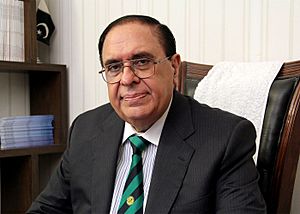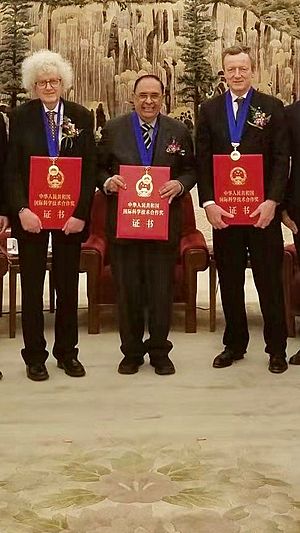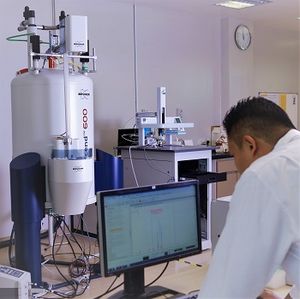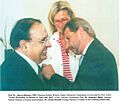Atta-ur-Rahman (chemist) facts for kids
Quick facts for kids
Atta-ur-Rahman
NI, FRS, FPAS
|
|
|---|---|

Atta-ur-Rahman in 2014
|
|
| Born | 22 September 1942 |
| Nationality | Pakistani |
| Alma mater | University of Karachi University of Cambridge |
| Known for | Natural product chemistry |
| Awards | UNESCO Prize (1999) |
| Scientific career | |
| Fields | Organic chemistry |
| Institutions | Higher Education Commission of Pakistan University of Tübingen University of Karachi University of Cambridge |
| Thesis | Synthetic Studies in the Indole Alkaloid Field (1968) |
| Doctoral advisor | J. Harley Mason |
| Other academic advisors | Ian Fleming |
Atta-ur-Rahman is a famous Pakistani organic chemist. He was born on September 22, 1942. He is known for his important work in chemistry and for helping to improve science and education in Pakistan.
He has held many important roles. These include being a Federal Minister for Science and Technology and for Education. He also led the Higher Education Commission, which helps universities in Pakistan. He is currently a professor at the University of Karachi. He is also the Chairman of the Prime Minister's Task Force on Science and Technology.
Contents
Early Life and Education
Atta-ur-Rahman was born in Old Delhi in 1942. His family was very academic. His grandfather, Sir Abdur Rahman, was a judge and led the University of Delhi. Later, his family moved to Lahore before Pakistan became independent. His father was a lawyer.
In 1952, his family settled in Karachi. Atta-ur-Rahman went to the Karachi Grammar School. He then studied at Karachi University.
University Studies
He earned his first degree in chemistry from Karachi University in 1963. He then got his master's degree in organic chemistry in 1964. After teaching for a year, he received a special scholarship. This allowed him to study for his PhD in the United Kingdom.
He joined King's College, Cambridge at the University of Cambridge. In 1968, he earned his PhD in organic chemistry. His research focused on natural products. These are chemicals found in plants and other living things. He continued his research at Cambridge until 1973. Later, in 2007, he became an honorary life fellow of King's College, Cambridge.
Career in Science and Education
Atta-ur-Rahman started his career as a lecturer at Karachi University in 1964. He also continued his work with Cambridge University for several years. In 1977, he became a co-director at the Hussain Ebrahim Jamal Research Institute of Chemistry in Karachi. He became the director there in 1990.
He did important studies on chemicals found in plants that can fight cancer. He also helped bring many positive changes to science, technology, and higher education in Pakistan. He wrote several important books on chemistry. One of his books, "Stereoselective Synthesis in Organic Chemistry," was praised by a Nobel Prize winner.
Important Roles in Government
Atta-ur-Rahman has worked closely with the Government of Pakistan. He helped shape policies for education and science. From 1996 to 2012, he was part of the Committee on Scientific and Technological Cooperation. This committee works with 57 countries to promote science.
In 1999, he became the Minister of Science and Technology. He helped create Pakistan's science policy. In 2002, he also became the Minister of Education. He then led the Higher Education Commission (HEC) until 2008. The HEC works to improve universities and colleges in Pakistan. He also advised the Prime Minister on science and technology.
Awards and Recognition
Atta-ur-Rahman has received many awards for his contributions. He is considered one of the most influential people in the Islamic World. Several institutions have been named after him. These include research centers in China and Malaysia. There are also laboratories and a school in Pakistan named in his honor.

Major Awards and Honors
He has received Pakistan's highest civil awards, including the Nishan-e-Imtiaz in 2002. He also received the UNESCO Science Prize in 1999. In 2007, he received a high civil award from the Austrian government. In 2020, the Chinese President Xi Jinping gave him the International Science and Technology Cooperation Award.
He is also a member of many important science academies around the world. These include the Chinese Academy of Sciences and the Royal Society in London. The World Academy of Sciences has even created a special award in his honor for young scientists. He has also received honorary degrees from many universities worldwide.
Images for kids
 | Jackie Robinson |
 | Jack Johnson |
 | Althea Gibson |
 | Arthur Ashe |
 | Muhammad Ali |



